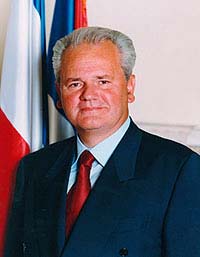Slobodan Milosevic's coffin displayed for second day, widow's attendance at burial uncertain
Thousands of weeping supporters of Slobodan Milosevic passed by the coffin of their late leader Friday, and it was still unclear whether Milosevic's widow would return from exile in Moscow to lay her husband to rest.

Members of Milosevic's Socialist Party kept a vigil overnight by his coffin, draped in a Serbian flag and covered with a wreath of red roses, the party's symbol. The party is organizing the funeral after authorities refused state ceremonies for the former Yugoslav president.
Milosevic died last weekend at a detention center near the U.N. war crimes tribunal in The Hague , Netherlands , which was trying him on 66 counts of war crimes, including genocide the first head of state to be extradited by his country for trial by the U.N. court.
Flown home on Wednesday, he is to be buried Saturday at a family estate in his home town of Pozarevac , about 50 kilometers (30 miles) southeast of Belgrade . His coffin went on public display on Thursday.
In Pozarevac on Friday, workers dug a double grave pit one for the late Serbian president and another for his widow Mirjana Markovic beneath the former ruling couple's favorite linden tree where the two reportedly first kissed, Serbia 's state television reported.
The Socialists on Friday reiterated expectations that Markovic and her son, Marko Milosevic, would arrive from Moscow for the burial.
Markovic, who lives in self-imposed exile in Russia , has indicated she was reluctant to come until all charges against her for alleged abuse of power during Milosevic's reign were dropped.
Questions and accusations have swirled this week about Milosevic's death. His son, Marko, says he was poisoned; the tribunal says he had a heart attack, and that a Dutch toxicological report indicates he was not poisoned; and Russia says Milosevic was not properly treated.
The Socialists, ousted from power along with Milosevic in 2000, are hoping to make political gains from their leader's death.
But a Serbian rights group, the Humanitarian Law Center , warned the "glorification of Milosevic after his death constitutes a shameful denial of his role" in the republic's recent past.
On Thursday, Milosevic's body was brought to a museum dedicated to the late communist dictator Josip Broz Tito in Belgrade 's plush Dedinje district. Thousands of die-hard supporters converged through the day to pass by the casket in front of which a large, framed color photograph of Milosevic was placed.
The turnout was much lower than organizers' predictions of tens of thousands, and nowhere near the huge crowds Milosevic once commanded in his heyday, when his fiery speeches inspired his followers to take part in wars in neighboring Bosnia and Croatia , and in Kosovo.
But the government tacitly allowed the Museum of Revolution , a decaying building holding gifts Tito received from foreign statesmen during his iron-fisted rule of ex-Yugoslavia from World War II until he died in 1980, be used instead.
Ironically, the museum is just a few hundred meters (yards) from the villa where Milosevic was arrested on April 1, 2001 , two months before his handover to the U.N. tribunal, reports the AP.
D.M.
Subscribe to Pravda.Ru Telegram channel, Facebook, RSS!





